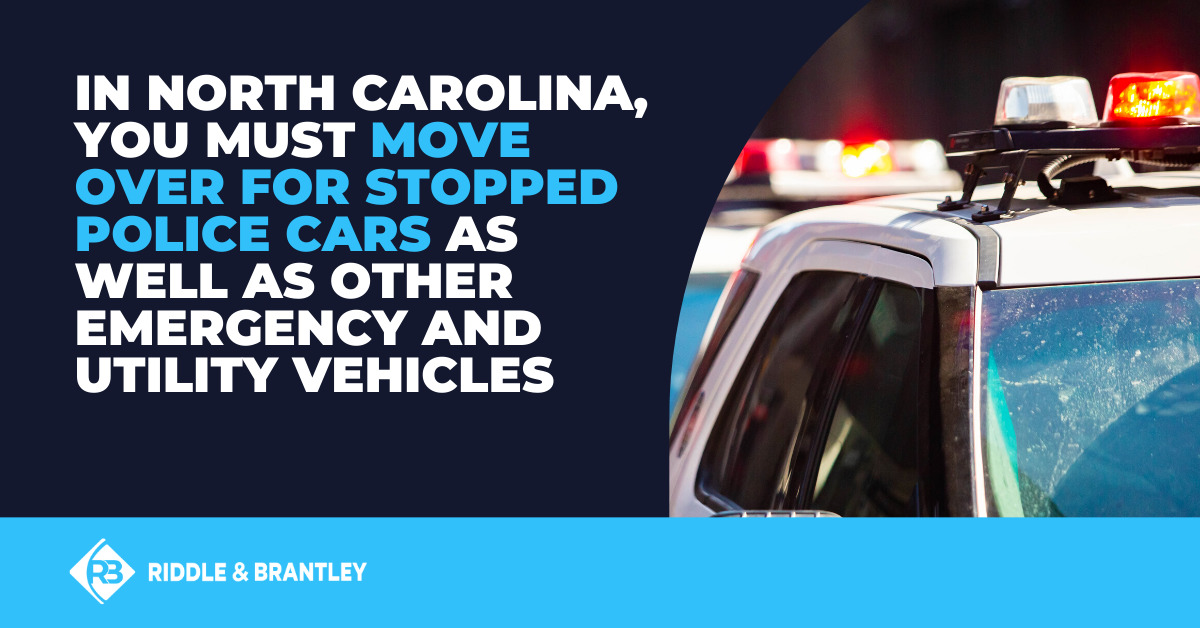Riddle & Riddle Injury Lawyers | January 29, 2019 | Car Accidents

The “Move Over” law in North Carolina requires motorists to move their vehicles away from the lane closest to parked law enforcement, emergency, or utility vehicles. The “Move Over” law is intended to protect emergency and utility workers and reduce the chances of an auto accident occurring when vehicles are stopped along the road.
Our North Carolina car accident attorneys are often asked about the “Move Over” law and how it may affect potential injury cases. In this blog post, we’ll dig into the North Carolina “Move Over” law and what you need to know.
What is the “Move Over” Law in North Carolina?
The “Move Over” statute in North Carolina states that motorists must change lanes or slow down when they see an emergency vehicle, state trooper, other law enforcement, or utility crews stopped on the shoulder of the road with its lights flashing. Utility vehicles are required to have a flashing amber light. Utility and service vehicles protected in this expanded law include electric, cable, telephone, gas and all state vehicles emitting an amber light. The statute is North Carolina General Statute 20-157.
“Do I Have to Move Over for Police Cars in North Carolina?”
Yes. If a police car is stopped along the roadway in North Carolina, you must move over, according to state law. However, the law also covers other types of vehicles, including other emergency vehicles (e.g., ambulances and fire trucks) and utility vehicles.
Drivers are required to move over to another lane away from the emergency or utility vehicle if there are enough lanes on the highway to do so or to simply slow down if it is a two-lane road. This will help avoid any secondary car accidents. Motorists are required to maintain a safe speed while moving into another lane.
This law is important because secondary accidents may be even more deadly than the first accident which they follow. Moreover, people are usually out of their vehicles while on the shoulder of the road, whether they are emergency responders or utility workers, and this can prove fatal if a person is hit by a passing car.
What is the Penalty for Not Moving Over for Emergency Vehicles in NC?
The “Move Over” law is often ignored by drivers and is putting law enforcement and other lives at risk. Troopers have been struck from behind and killed because of careless drivers that fail to obey this law. A violation of the move over law will result in a mandatory fine of $250.00 plus court costs over $200. Violating the “Move Over” law, damaging property or causing injury doubles the fine to $500.00 and is a class one misdemeanor. Moreover, a conviction is considered a moving violation and counts as 3 points on your license and will cause at least a 25% insurance surcharge for three years.
Additional Penalties for Violating the “Move Over” Law in North Carolina
In 2019, the penalties for violating the North Carolina Move Over law were tightened, and those who injure or kill a law enforcement officer, first responder or utility worker stopped on the side of the road face serious felony charges. Even those with an otherwise clean record may face time in prison under the updated guidelines.
Have You Been Injured in an Auto Accident Involving a Vehicle Stopped on the Roadside?
If you’ve been hurt due to someone else’s negligence in a crash involving a vehicle stopped on the roadside, you may be entitled to compensation — and an experienced North Carolina car accident attorney at Riddle & Riddle may be able to help. Call 1-800-525-7111 for a free, no-obligation consultation today. There are no upfront costs, and we don’t get paid unless you do. That’s our promise to you.
Justice Counts.
Contact a Personal Injury Lawyer from Riddle & Riddle Injury Lawyers for Help Today
For more information, please contact Riddle & Riddle Injury Lawyers to schedule a free consultation with a personal injury lawyer in North Carolina today. We have twelve convenient locations in North Carolina, including Greenville, Raleigh, Goldsboro, Jacksonville, Kinston, Charlotte, Greensboro, Durham, Fayetteville, Wilmington, Winston-Salem & Garner.
Riddle & Riddle Injury Lawyers – Raleigh Office
4600 Marriott Dr STE 500, Raleigh, NC 27612
(919) 876-3020
Riddle & Riddle Injury Lawyers – Charlotte Office
1914 J N Pease Pl Suite 142, Charlotte, NC 28262
(704) 486-5824
Riddle & Riddle Injury Lawyers – Durham Office
100 E Parrish St STE 200, Durham, NC 27701
(919) 728-1770
Riddle & Riddle Injury Lawyers – Garner Office
500 Benson Rd Suite 111, Garner, NC 27529
(800) 525-7111
Riddle & Riddle Injury Lawyers – Greensboro Office
7B Corporate Center Ct Suite 15, Greensboro, NC 27408
(336) 516-9066
Riddle & Riddle Injury Lawyers – Greenville Office
300 E Arlington Blvd Suite 2A #110, Greenville, NC 27858
(252) 397-8620
Riddle & Riddle Injury Lawyers – Goldsboro Office
601 N Spence Ave, Goldsboro, NC 27534
(919) 778-9700
Riddle & Riddle Injury Lawyers – Jacksonville Office
3391 Henderson Dr, Jacksonville, NC 28546
(910) 455-5599
Riddle & Riddle Injury Lawyers – Kinston Office
807 N Queen St, Kinston, NC 28501
(252) 397-8624
Riddle & Riddle Injury Lawyers – Fayetteville Office
2517 Raeford Rd, Fayetteville, NC 28305
(910) 387-9186
Riddle & Riddle Injury Lawyers – Wilmington Office
1608 Queen St Suite 12, Wilmington, NC 28401
(910) 889-4064
Riddle & Riddle Injury Lawyers – Winston-Salem Office
102 W 3rd St, Ste 1007, Winston-Salem, NC 27101
(336) 516-9042
